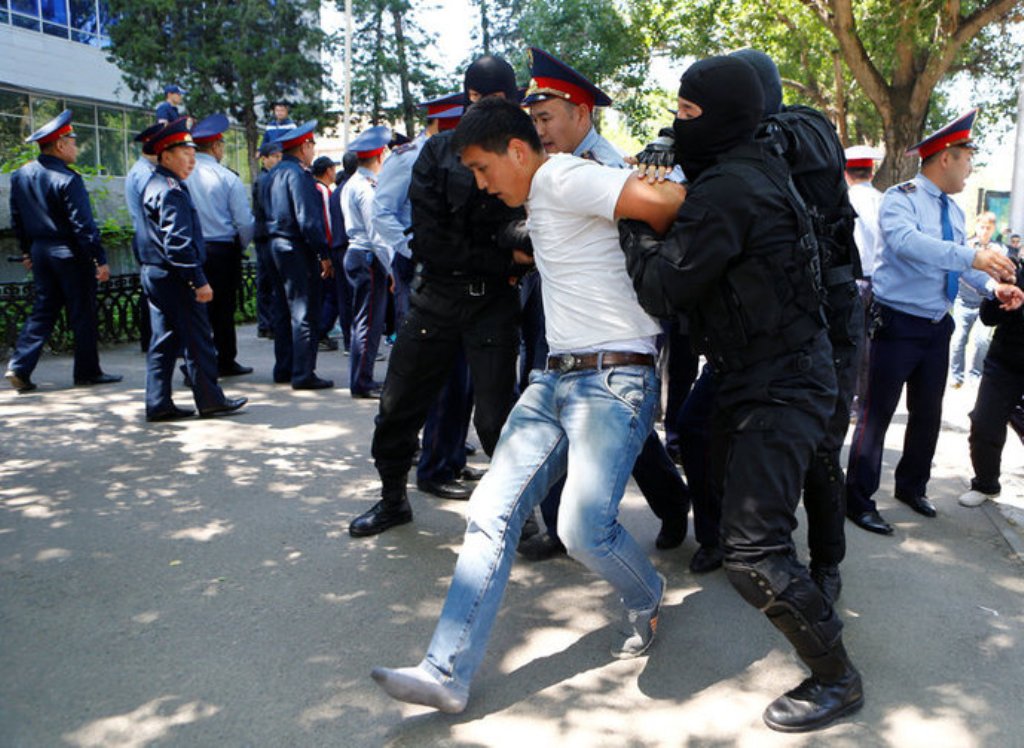Again people in Kazakhstan went out to the streets protesting against the obvious lawlessness and lies from of the regime, and in this case, the protests were caused by results of elections during which the previous president, Narsultan Nazarbayev in fact carried out a formal power transit to his creation, but keeping in his hands key levers of power — the Security Council and the Nur Otan party. Thus, he, after being in power in Kazakhstan for almost 30 years, moved to not only honorable, but in fact not at all formal political position, including the official “Elbasy” status (leader of the nation) specially established in legislation for him. And more likely, Nazarbaev even has full control over the newly elected president also.
Recall that on the June 9th elections of a new president were held, and after the announcement of the counting of votes in the country’s cities mass protests of citizens dissatisfied with election fraud began particularly in such cities as Almaty, Nur-Sultan and Shymkent. The arrests of protesting citizens continued on 10th and 11th of June.
According to official information, about 700 people were detained in different cities, but human rights activists stated, that the true scale of the protests is much greater. According to information provided by Saparbek Nurpeisov, the chief Public Interest Defense Service of General Prosecutor’s office, the court imposed administrative penalties for 957 people, 670 of whom were arrested for terms of imprisonment from 6 to 15 days, and fined 115 people. Moreover, the protesters’ detentions were accompanied by physical violence, as a result of which even one of the protestors died on the spot from a blow to the head. Also, many of the protesters were in fact kidnapped in different parts of the cities after the rally by people in black masks.
The newly elected president Kasym-Zhomart Tokayev, in the hope of changing the image of the Kazakh regime in the West, stated during an interview to American media WSJ that he will carry out reforms, that he is a “reformer” and he would not “maintain the status quo”. In an interview with the Euronews TV channel he stated that “work is underway on analyzing social requirements” of people who went out on the eve of protest actions, and explained the rallies with “economic difficulties in the country and currency devaluation”. “The authorities have heard”, — he added, as if it was not against his election, people walked on the streets under the batons of police officers.
At the same time a slow civil protest was spreading, for example, in Almaty, unknown people hung a banner with the inscription: “Not my president”. This phrase became the slogan that people who disagree with the election results began to use in social networks. The authorities reacted by blocking social networks to not allow the spread in Internet calls and information about protests.
As a result, today we can say that all street activity of people has ended, and anger has returned to the place where it has matured all this time – to social networks, where thousands of active users complain daily about problems in Kazakhstan, especially about the authoritarian regime of Nazarbayev, usurped power in the country.
Of course, the protesters’ actions did not bring any fruit at all, because they were not moved by any particular project, and they didn’t even have a leader – all candidates who lost the elections stood against any protest actions, i.e. behaved like technical candidates that participated in the elections only for creation of sense of the legitimacy of the elections. However, the peculiarities of political life in Kazakhstan are so hard, that even if the regime would decide to allow to elections a real opposition and not a technical candidate, there is simply no such candidate. Also not to mention that this is completely incorrect and invalid from the point of view of Shari’a elections, which took place within the framework of a democratic system, i.e. kufr systems. Unfortunately, the protests were not caused by the growth of Islamic political consciousness among the population, but only by the influence of Western ideas of liberalism and democracy on the people. The regime succeeded in putting the Islamic movements and parties out of the brackets of life in Kazakhstan, skillfully setting off different forces among themselves in some cases and intimidating, physically pressing in others. That is, the internal policy of Nazarbayev, given the rather large size of the country, is quite successful from the point of view of his authoritarian regime.
And this is also not surprising, given that Nazarbayev’s advisors were experienced Western politicians such as Tony Blair. Back in 2012, he helped Nazarbayev to stop the protest moods in the country after a months-long strike of thousands of oil workers in the city of Zhanaozen in the Mangystau region ended with the dispersal of firearms and the death of at least 16 people. This, by the way, is a good example of solidarity of the leaders of Western countries (even if they are former) with rulers in Muslim countries, example of support these Taghuts and tyrants even after the end of their authority.
Thus, despite the protests, the new president, and, in fact, just a subordinate and creature of Nazarbayev, Kasym-Zhomart Tokayev, was sworn in after the elections, and during the whole ceremony he was extremely thankful and praised the so-called “Elbasy”, promising to maintain the course of the former president, as if he has a choice in this.
Allah the Almighty said:
وَلَا تَحْسَبَنَّ اللَّهَ غَافِلًا عَمَّا يَعْمَلُ الظَّالِمُونَ إِنَّمَا يُؤَخِّرُهُمْ لِيَوْمٍ تَشْخَصُ فِيهِ الْأَبْصَارُ
“And never think that Allah is unaware of what the wrongdoers do. He only delays them for a Day when eyes will stare [in horror].” [14:42]
Mohammad Mansour
Written for Ar-Rayah Newspaper – Issue 240

